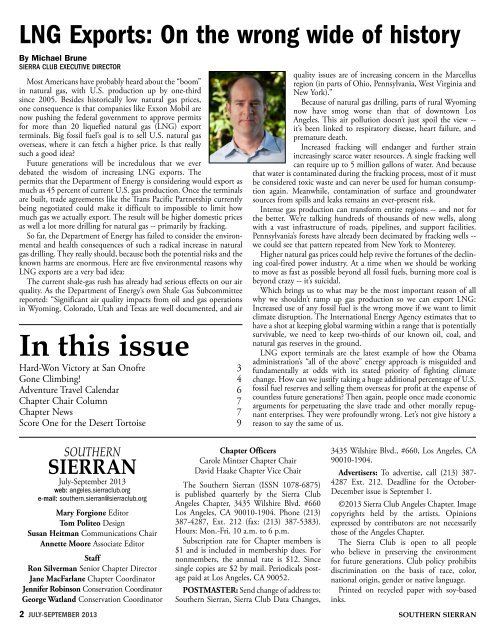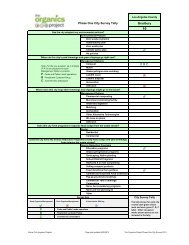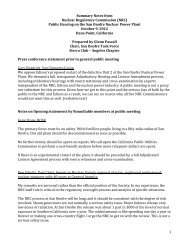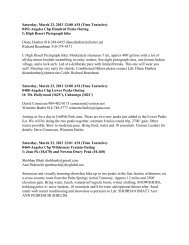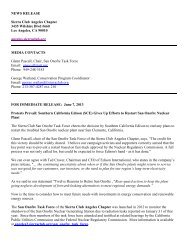July-September 2013 - Sierra Club - Angeles Chapter
July-September 2013 - Sierra Club - Angeles Chapter
July-September 2013 - Sierra Club - Angeles Chapter
- No tags were found...
You also want an ePaper? Increase the reach of your titles
YUMPU automatically turns print PDFs into web optimized ePapers that Google loves.
LNG Exports: On the wrong wide of historyBy Michael BruneSIERRA CLUB EXECUTIVE DIRECTORMost Americans have probably heard about the “boom”in natural gas, with U.S. production up by one-thirdsince 2005. Besides historically low natural gas prices,one consequence is that companies like Exxon Mobil arenow pushing the federal government to approve permitsfor more than 20 liquefied natural gas (LNG) exportterminals. Big fossil fuel’s goal is to sell U.S. natural gasoverseas, where it can fetch a higher price. Is that reallysuch a good idea?Future generations will be incredulous that we everdebated the wisdom of increasing LNG exports. Thepermits that the Department of Energy is considering would export asmuch as 45 percent of current U.S. gas production. Once the terminalsare built, trade agreements like the Trans Pacific Partnership currentlybeing negotiated could make it difficult to impossible to limit howmuch gas we actually export. The result will be higher domestic pricesas well a lot more drilling for natural gas -- primarily by fracking.So far, the Department of Energy has failed to consider the environmentaland health consequences of such a radical increase in naturalgas drilling. They really should, because both the potential risks and theknown harms are enormous. Here are five environmental reasons whyLNG exports are a very bad idea:The current shale-gas rush has already had serious effects on our airquality. As the Department of Energy’s own Shale Gas Subcommitteereported: “Significant air quality impacts from oil and gas operationsin Wyoming, Colorado, Utah and Texas are well documented, and airIn this issueHard-Won Victory at San Onofre 3Gone Climbing! 4Adventure Travel Calendar 6<strong>Chapter</strong> Chair Column 7<strong>Chapter</strong> News 7Score One for the Desert Tortoise 9quality issues are of increasing concern in the Marcellusregion (in parts of Ohio, Pennsylvania, West Virginia andNew York).”Because of natural gas drilling, parts of rural Wyomingnow have smog worse than that of downtown Los<strong>Angeles</strong>. This air pollution doesn’t just spoil the view --it’s been linked to respiratory disease, heart failure, andpremature death.Increased fracking will endanger and further strainincreasingly scarce water resources. A single fracking wellcan require up to 5 million gallons of water. And becausethat water is contaminated during the fracking process, most of it mustbe considered toxic waste and can never be used for human consumptionagain. Meanwhile, contamination of surface and groundwatersources from spills and leaks remains an ever-present risk.Intense gas production can transform entire regions -- and not forthe better. We’re talking hundreds of thousands of new wells, alongwith a vast infrastructure of roads, pipelines, and support facilities.Pennsylvania’s forests have already been decimated by fracking wells --we could see that pattern repeated from New York to Monterey.Higher natural gas prices could help revive the fortunes of the decliningcoal-fired power industry. At a time when we should be workingto move as fast as possible beyond all fossil fuels, burning more coal isbeyond crazy -- it’s suicidal.Which brings us to what may be the most important reason of allwhy we shouldn’t ramp up gas production so we can export LNG:Increased use of any fossil fuel is the wrong move if we want to limitclimate disruption. The International Energy Agency estimates that tohave a shot at keeping global warming within a range that is potentiallysurvivable, we need to keep two-thirds of our known oil, coal, andnatural gas reserves in the ground.LNG export terminals are the latest example of how the Obamaadministration’s “all of the above” energy approach is misguided andfundamentally at odds with its stated priority of fighting climatechange. How can we justify taking a huge additional percentage of U.S.fossil fuel reserves and selling them overseas for profit at the expense ofcountless future generations? Then again, people once made economicarguments for perpetuating the slave trade and other morally repugnantenterprises. They were profoundly wrong. Let’s not give history areason to say the same of us.SOUTHERNSIERRAN<strong>July</strong>-<strong>September</strong> <strong>2013</strong>web: angeles.sierraclub.orge-mail: southern.sierran@sierraclub.orgMary Forgione EditorTom Politeo DesignSusan Heitman Communications ChairAnnette Moore Associate EditorStaffRon Silverman Senior <strong>Chapter</strong> DirectorJane MacFarlane <strong>Chapter</strong> CoordinatorJennifer Robinson Conservation CoordinatorGeorge Watland Conservation Coordinator<strong>Chapter</strong> OfficersCarole Mintzer <strong>Chapter</strong> ChairDavid Haake <strong>Chapter</strong> Vice ChairThe Southern <strong>Sierra</strong>n (ISSN 1078-6875)is published quarterly by the <strong>Sierra</strong> <strong>Club</strong><strong>Angeles</strong> <strong>Chapter</strong>, 3435 Wilshire Blvd. #660Los <strong>Angeles</strong>, CA 90010-1904. Phone (213)387-4287, Ext. 212 (fax: (213) 387-5383).Hours: Mon.-Fri. 10 a.m. to 6 p.m.Subscription rate for <strong>Chapter</strong> members is$1 and is included in membership dues. Fornonmembers, the annual rate is $12. Sincesingle copies are $2 by mail. Periodicals postagepaid at Los <strong>Angeles</strong>, CA 90052.POSTMASTER: Send change of address to:Southern <strong>Sierra</strong>n, <strong>Sierra</strong> <strong>Club</strong> Data Changes,3435 Wilshire Blvd., #660, Los <strong>Angeles</strong>, CA90010-1904.Advertisers: To advertise, call (213) 387-4287 Ext. 212. Deadline for the October-December issue is <strong>September</strong> 1.©<strong>2013</strong> <strong>Sierra</strong> <strong>Club</strong> <strong>Angeles</strong> <strong>Chapter</strong>. Imagecopyrights held by the artists. Opinionsexpressed by contributors are not necessarilythose of the <strong>Angeles</strong> <strong>Chapter</strong>.The <strong>Sierra</strong> <strong>Club</strong> is open to all peoplewho believe in preserving the environmentfor future generations. <strong>Club</strong> policy prohibitsdiscrimination on the basis of race, color,national origin, gender or native language.Printed on recycled paper with soy-basedinks.2 JULY-SEPTEMBER <strong>2013</strong> SOUTHERN SIERRAN


